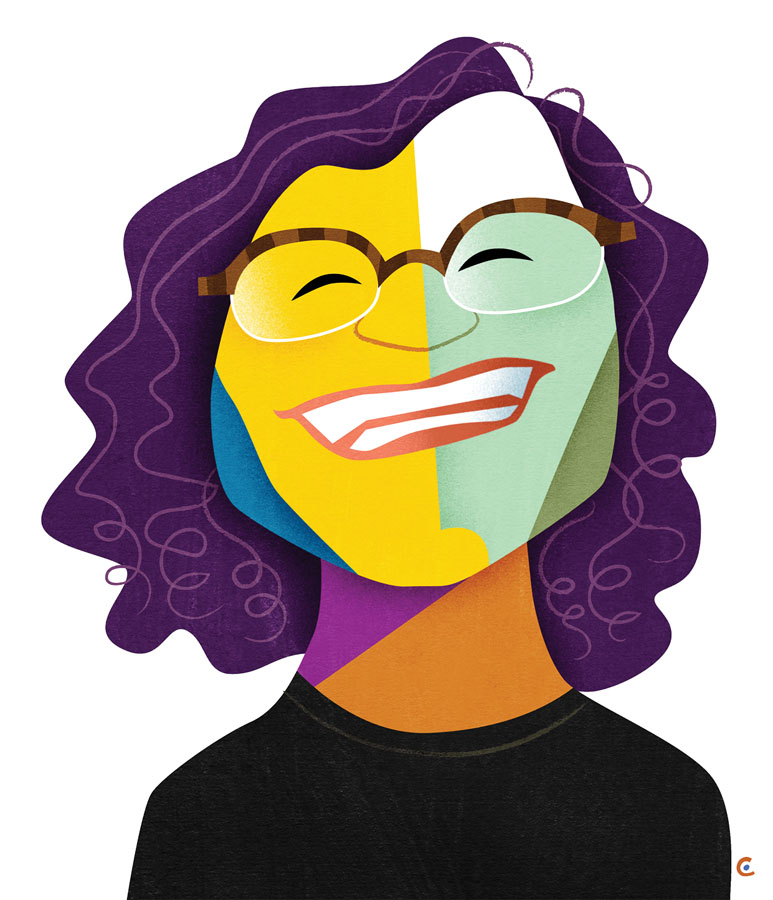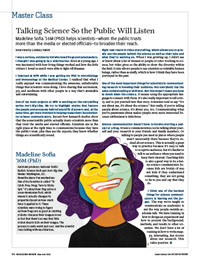Master Class
 (Photo: David Cowles for Rochester Review)
(Photo: David Cowles for Rochester Review)Madeline Sofia ’16M (PhD)
Assistant producer, National Public Radio’s Science Desk and Joe’s Big Idea
Home: Washington, D.C.
Favorite story I’ve worked on: One of my favorites is called “To Catch Prey, Frogs Turn to Sticky Spit.” It’s about how frog saliva is a non-Newtonian fluid, which means it actually changes its properties based on how much force is applied to it. These scientists were trying to figure out how frogs are so good at catching crickets—because their tongues move so fast that there’s no way that little cricket should stick on their tongue. The process is really weird and cool. And the scientist I was talking with was hilarious.
I was a curious, outdoorsy kid who loved frogs and salamanders. I thought I was going to be a veterinarian. Even at a young age, I was fascinated with how living things worked and how the little critters I loved so much were able to fight off diseases.
I interned at NPR while I was getting my PhD in microbiology and immunology at the Medical Center. I realized that what I really enjoyed was communicating the awesome, unbelievable things that scientists were doing. I love sharing that excitement, joy, and nerdiness with other people in a way that’s attainable and entertaining.
One of my main projects at NPR is working on the storytelling series Joe’s Big Idea. We try to highlight stories that feature the people and processes behind scientific discovery and, at the same time, get more involved in helping researchers become better science communicators. Recent Pew Research studies show that the nonscientific public actually trusts scientists more than they trust the media and elected officials. Scientists are in the right place at the right time to communicate because they have the public’s trust, plus they are the experts; they know whether things are scientifically sound.
Right now I work in video storytelling, which allows you to actually see the people behind the science as well as their labs and what they’re working on. When I was growing up, I didn’t see or know about a lot of women or people of color working in science, but video gives us the ability to show the diversity within the field. It also allows people to see scientists as relatable human beings, rather than as stuffy, which is how I think they have been portrayed in the past.
One of the most important things for scientists in communicating research is knowing their audience. Not everybody has the same understanding or skill sets. But this doesn’t mean you have to dumb down the science. It means using the appropriate language to connect with them. It’s also really important to tell a story, and to put yourself into that story. Scientists tend to say “It’s not about me, it’s about the science.” But really, if you’re telling people about science, it’s about you, too. Communicating what you’re passionate about makes people even more interested because enthusiasm is infectious.
Science communication doesn’t have to involve starting a podcast or a blog. Science communication can be talking about yourself and your research to your friends and family members. Or talking to people you meet in places where people aren’t necessarily there because they’re excited about science. This is actually a great way to practice because it’s easy to talk to a captive audience, but it’s harder to talk to an audience when you need to keep their interest. Teaching kids is also a good way to be a better science communicator, because kids are brutal—if you ask kids if they understand something, they are not going to lie to you and say that they do.
I think one of the hardest things for science communicators is leaving out the jargon. The way we’re taught to communicate as academics is not the way people outside academia talk. We have training in how to design an experiment and how to present the background, methods, and results to other scientists. We don’t have a lot of training in how to write snappy, interesting, fun stories about our research. This takes practice.

